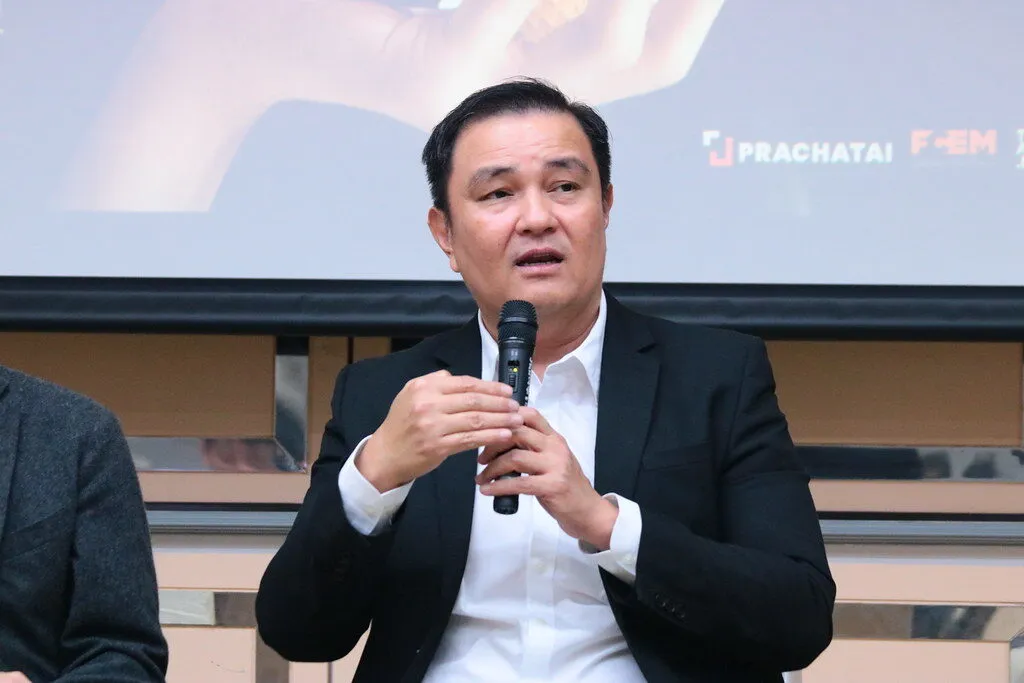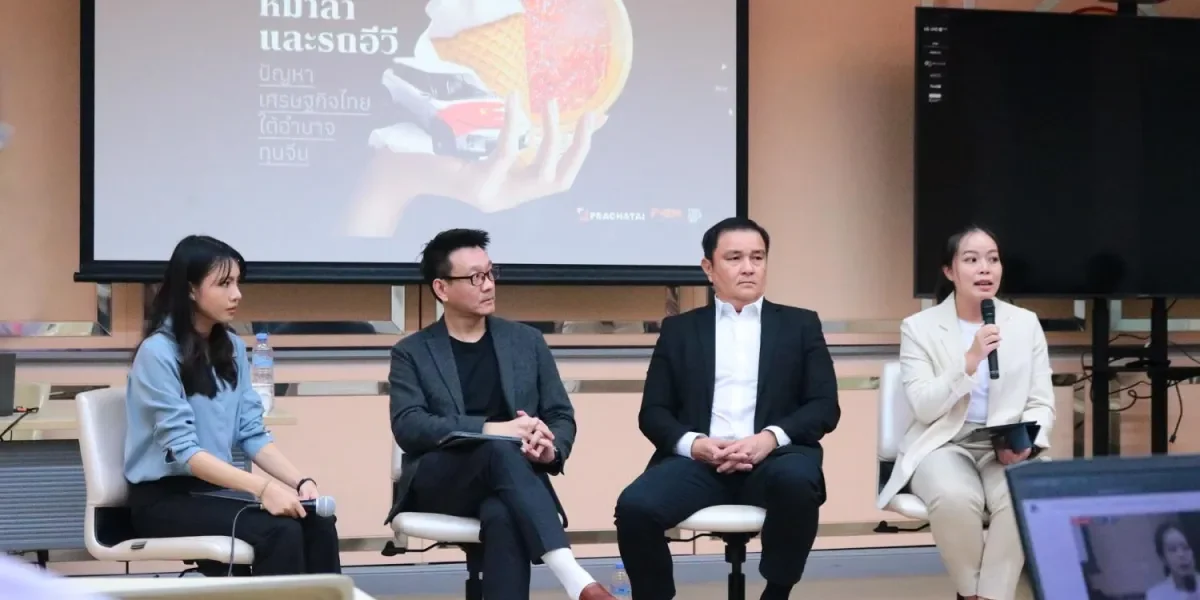Caught in the middle of a trade war between the US and China, Thailand is becoming a new manufacturing base for Chinese companies, especially in technology. Meanwhile, Thai SMEs are facing an influx of cheaper Chinese goods, leading to concerns that Thailand will face a worsening trade deficit with China and will not be able to compete in the world market.
At a panel discussion “1 baht tissue, mala hotpot, and EVs: the problems of the Thai economy under the power of Chinese capital,” Veerayooth Kanchoochat from the National Graduate Institute for Policy Studies (GRIPS) in Tokyo, Japan, President of the Thailand Automotive Institute Kriengsak Wongpromrat, and Pongkwan Sawasdipakdi from Thammasat University’s Faculty of Political Science discussed Thailand’s economic relationship with China and the future of Thailand in the world market.
The panel discussion is part of a series of seminars organized by Prachatai for its 20th anniversary.
Regulations needed to protect local businesses

Veerayooth, who is also an advisor to the House Committee on Economic Development, said that Thailand has been facing an increasingly negative trade balance with China since the latter opened its economy to the world and the Tom Yum Kung crisis. Thailand currently experiences a trade deficit with China in several industries, including electronics and automotive parts. With a deficit of 6-7% of GDP, Thailand can no longer compete with China in these areas, except for agriculture, where it still enjoys a trade surplus, such as in the export of durians.
Thailand’s trade deficit with China is also at risk of spreading to other industries, even though its trade surplus with other countries exceeds its deficit with China. The surplus it now has could also shrink as Thai SMEs lose their ability to compete in the market.
Veerayooth said there are several ways of maintaining a trade balance with China, but Thailand will need to consider how much these measures will affect its relationship with China and whether they are worth it before implementing them.
The government could revise existing regulations, impose a tax on online purchases, and introduce measures to support SMEs, Veerayooth said. It could also enforce more strictly regulations about trade competition, like the existing anti-dumping law, or apply the same quality control standards to imported goods as domestic goods, and a one-stop complaint centre could be opened to receive complaints about illegal business activities. E-commerce platforms could be controlled by using an AI system such as is used in China for quality control and to identify sellers.
Thailand could also use what Veerayooth called the “Indonesia Model,” in which domestic goods and services are protected and Chinese competitors are prevented from entering the same market to give domestic entrepreneurs a chance to develop and compete. He noted, however, that this is a drastic measure and that Indonesia is able to impose it because the country is a source of nickel, which China needs to manufacture batteries. At any rate, Veerayooth said that some kind of measures are needed to ensure that local businesses have a chance to compete fairly with Chinese businesses, and that Thailand can build businesses that can enter the market.
Thai manufacturers need to adjust to the EV business

Kriengsak noted that Thailand is one of the world’s main manufacturing bases for automobile parts, but the entire supply chain is built to serve the internal combustion engine (ICE) vehicle industry. Meanwhile, the world is looking for a solution to reduce carbon emissions, and China, knowing that it cannot compete in the ICE market, has turned to making electric vehicles (EVs).
At least 7 Chinese EV companies are now setting up manufacturing plants in Thailand, and Kriengsak expects there will be more. However, the over 200 parts manufacturers in Thailand are still unable to make EV parts, forcing Chinese companies to import parts for assembly. It is also difficult to make Thai manufacturers switch to making EV parts, Kriengsak said, because Thailand still makes more ICE vehicles than EVs.
The arrival of EVs will not only disrupt the supply chain but will also change the ecosystem of vehicle use in Thailand, Kriengsak said, since the ecosystem, from insurance to maintenance and charging stations, will have to adjust to make room for a different kind of vehicle.
He also pointed out that private vehicles are employing more smart systems which include tracking devices. The protection of personal data might become an excuse for a trade barrier, especially between the US and China, he said, since concerns could be raised about smart systems installed in vehicles being used to collect information.
US-China trade war likely to continue

Pongkwan noted that Thailand is a small country in close proximity to a larger country like China, and that it is likely to be difficult to extract itself from dependence or set up barriers. She said that the models of international relations that are most commonly studied are often between powerful nations, and not between smaller nations and more powerful ones.
Since the Obama administration, the US has seen China as a competitor, Pongkwan said. No matter who wins the 2024 presidential election, it is likely that the US will continue to put up trade barriers to block Chinese products and that it will continue to do so until it believes that China can no longer compete with it both in terms of trade and arms technology.
In practice, however, Pongkwan said that the trade barriers between the two nations did not do much to reduce Chinese imports which in fact increased. Nevertheless, she said that this meant Chinese companies made less profit and could not further reduce their prices. They also cannot export their products to Europe, where there are stricter regulations, so Chinese products are likely to be exported to countries with weaker standards and regulations.
Pongkwan noted that the Biden administration banned American investors from investing in Chinese technology industries, while also banning other countries from using US equipment to make semiconductors. If this trend continues, she said, Thailand is unlikely to benefit from the US-China trade war.


